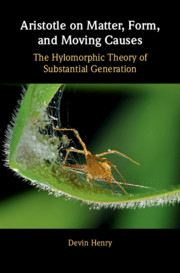Book contents
- Aristotle on Matter, Form, and Moving Causes
- Aristotle on Matter, Form, and Moving Causes
- Copyright page
- Dedication
- Contents
- Preface and Acknowledgements
- Abbreviations of Aristotle’s Works
- Introduction
- Chapter 1 Preliminary Puzzles
- Chapter 2 The Hylomorphic Model of Substantial Generation: Physics I
- Chapter 3 Substantial versus Non-Substantial Change: GC I 1–4
- Chapter 4 The Extended Hylomorphic Model: GC II 9
- Chapter 5 Biological Generation: Part One
- Chapter 6 Biological Generation: Part Two
- Chapter 7 The Efficient Cause of Animal Generation
- Chapter 8 The Architectonic Model
- Chapter 9 The Cosmological Significance of Substantial Generation
- Bibliography
- Index Locorum
- Subject Index
Chapter 5 - Biological Generation: Part One
Published online by Cambridge University Press: 14 November 2019
- Aristotle on Matter, Form, and Moving Causes
- Aristotle on Matter, Form, and Moving Causes
- Copyright page
- Dedication
- Contents
- Preface and Acknowledgements
- Abbreviations of Aristotle’s Works
- Introduction
- Chapter 1 Preliminary Puzzles
- Chapter 2 The Hylomorphic Model of Substantial Generation: Physics I
- Chapter 3 Substantial versus Non-Substantial Change: GC I 1–4
- Chapter 4 The Extended Hylomorphic Model: GC II 9
- Chapter 5 Biological Generation: Part One
- Chapter 6 Biological Generation: Part Two
- Chapter 7 The Efficient Cause of Animal Generation
- Chapter 8 The Architectonic Model
- Chapter 9 The Cosmological Significance of Substantial Generation
- Bibliography
- Index Locorum
- Subject Index
Summary
I now want to turn to the generation of biological substances in the Generation of Animals. I have stressed the fact that Aristotle treats living things as substances ‘most of all’ (Metaph. 1034a3–4) and so biological generation should be seen as substantial generation par excellence. This forms the focus of the next two chapters. The central aim of the discussion is to set out in detail what I shall call Aristotle’s “reproductive hylomorphism”, which is a more specific application of the basic hylomorphic model from the foundational works to the generation of living things. By way of introduction I shall begin with some remarks about the project of the GA itself.
Information
- Type
- Chapter
- Information
- Aristotle on Matter, Form, and Moving CausesThe Hylomorphic Theory of Substantial Generation, pp. 105 - 129Publisher: Cambridge University PressPrint publication year: 2019
